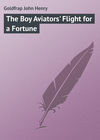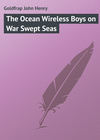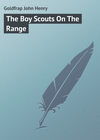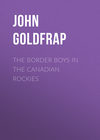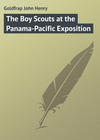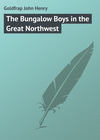Buch lesen: «The Boy Aviators' Flight for a Fortune», Seite 7
CHAPTER XVI. – OFF ON THE “AIR ROUTE.”
In the meantime indignation was at white heat on Brig Island. Mr. Sterrett was for advertising the disappearance of Duval, and offering a reward for his apprehension. He confessed that he had not liked the man’s looks, but had shipped him as help was hard to get at the time. Dr. Perkins agreed that it might not be a bad idea to communicate at once with the authorities and try to have the rascal captured.
“But,” he added, “I am afraid he is too clever a scamp to fall into the clutches of the law very easily.”
“I am of that opinion, too,” frankly admitted Mr. Sterrett, “but it will do no harm to do all we can to place him where he belongs.”
To get ashore Frank had first to swim off to the motor boat, for the skiff, as we know, had vanished. He then ran the engine-driven craft in alongside some rocks that sloped down into deep water, and from that elevation the party embarked. A quick run was made to Motthaven, from whence a description of Duval was wired to the metropolitan police, and the local authorities urged out of their usual lethargy by promises of a reward if Duval was found. Late that afternoon the search yielded results in the finding of the abandoned skiff, and the discovery of the hut in which the Daniels had been living since the boys had instituted proceedings against them.
Some evidences of a hasty departure were found, but no clews that would give any idea of whither the fugitives had proceeded. In fact it was only by piecing together some scraps of torn paper that it was discovered that the hut had been used by the Daniels as a refuge.
“Well,” said Dr. Perkins that evening, after they had bidden good-by to Mr. Sterrett and his friend, who had returned to New York, “well, in my opinion the less time we lose in getting to Black Bayou the better it will be, for, to my mind, there is little doubt that Duval means to forestall our friend, Ben Stubbs, in ransacking the wreck.”
The others agreed that this seemed highly probable, and Dr. Perkins made immediate arrangements for a caretaker to occupy quarters on Brig Island during their absence. This done, a return was made to the little settlement, and the next day final preparations were made for the adventurous trip through the air. The Sea Eagle was provisioned, and a light wireless apparatus installed, the stay wires being used as aërials. Of course the instruments were not so strong as those used at the shore station, but it was calculated that they had a capacity of about twenty miles over land, and forty above the sea, depending, of course, a good deal on the wave adjustment and the weather conditions.
Twenty-four hours after the adventurers had started work on the Sea Eagle, the craft was ready for her dash. Ben Stubbs, Pudge Perkins and Billy Barnes were to go to New Orleans, there to await the arrival of the party. Their departure took place amid regretful wails from Pudge, who loudly declaimed:
“Aërials and ant-hills! I don’t see why we can’t go by the Sea Eagle.”
But Dr. Perkins’ word was law and he had decided that the fewer persons who took part in the test the better the chance of success would be, and as Frank and Harry were both experienced aviators he placed great reliance in their aid. The morning after the departure of the New Orleans-bound passengers the caretaker and his family arrived. They were honest folk from the shore, who could be trusted to look after the many valuable devices on the island, and keep curiosity seekers off till the party returned. For Dr. Perkins had decided to use Brig Island as a permanent workshop, and expected, if the Sea Eagle proved a success, to build many craft like her and dispose of them at good prices. The working of the electric fence was explained to the caretaker; but he declared:
“I reckon my old gun will do more to keep undesirables off than any of them electric didoes.”
There was now nothing more to do, the caretaker being duly installed, but to take to the air, in what was, at that date, the most unique aërial craft in existence. For the voyage, beside the provisions and extra fuel and oil, life belts had been provided, and not a detail had been overlooked. It was seven o’clock on a fine, breathless morning when Dr. Perkins gave the order, “Start up the engines!”
A thrill shot through both Frank and Harry at the words. Experienced in aërial adventure as were both boys, they could not but feel that they were embarking on the most adventurous undertaking of their lives.
“We’re off!” cried Harry, as a quiver ran through the craft, and the motor roared from its exhausts, emitting clouds of mingled flame and blue smoke.
“Yes; off on a fight for fame and fortune!” cried Frank, as Dr. Perkins threw in the clutch; and, with her propellers beating the air so rapidly that they were a mere blur, the Sea Eagle shot skyward.
In half an hour’s time, to the watchers on the island, the aërial craft had dwindled to a mere dot in the distant sky, and five minutes later she vanished from view. The boys gave many backward looks as they winged away from Brig Island. Despite their adventures, they had spent many pleasant days there, and it appeared to them to be almost a second home. Of all that they were to experience before returning to the island they little dreamed at the moment, but their hearts beat high with exultation as the Sea Eagle winged her way southward at forty miles an hour, and about five hundred feet above the ocean.
They had been in the air about an hour when they encountered a situation which may become common enough before many years have passed, but which was an exciting novelty to them. Off on the horizon a liner was sighted, steaming toward the American coast. Before long they made her out to be a big, two-funneled craft, painted black, and with numerous decks rising above her shapely hull.
“One of the transatlantic liners that make Portland their terminal,” decided Dr. Perkins.
“Shall I wireless them?” said Harry.
“Yes, do so. It will be an interesting experiment, and besides will show how the apparatus will work.”
Harry lost no time in getting to work. After a brief interval he “raised” the operator on the liner, Dr. Perkins keeping the Sea Eagle swinging in big, lazy circles while he did so.
“We sighted you from the bridge half an hour ago,” flashed the operator, “who and what are you?”
“The hydro-aëroplane Sea Eagle, bound from Maine for New Orleans. Who are you?” flashed back Harry.
“The Ultonia, of the Portland and Liverpool line, eight days out from England,” was the rejoinder; “have you got any American newspapers on board?”
Now it happened that Dr. Perkins had brought some papers of the day before along in his pockets, and at Harry’s request he handed them to him.
“What are you going to do?” asked Frank.
“I was going to suggest that we dive across the Ultonia and deliver the papers,” said Harry; “can we do it, doctor?”
“By all means,” rejoined Dr. Perkins, deeply interested; “flash them a message of what we intend to do so that they may be prepared.”
Harry sent out the message and the operator flashed back a quick “Thanks,” adding the next moment: “Good-by. I’m going to beat it out on deck and watch you.”
Frank, in the meantime, had done the papers up in a compact bundle and weighted them with an empty beef can.
“All ready?” cried Dr. Perkins.
“All ready, sir,” was the prompt reply from the boys.
“Then hold tight. I’m going to make a swift dive.”
The liner was now almost directly underneath the soaring Sea Eagle. Her rails were black with passengers craning their necks upward at the great, man-made bird. From her funnels poured clouds of inky smoke, while her sharp prow cut the water on each side of her bow into sparkling foam. On the bridge were uniformed officers, pointing binoculars and spy glasses aloft, for the operator had communicated the news of what the Sea Eagle was about to do.
Suddenly the watching throngs of ocean travelers saw the Sea Eagle poise in air like a hawk about to pounce. Then down she came, cleaving the air like a falling stone.
A great cry went up from the packed decks. It seemed as if the air craft must perish, that nothing could check her fall, and that she was doomed to plunge headlong into the sea. But in a flash the cry changed to a mighty cheer.
Less than forty feet from the water the Sea Eagle was seen to shoot upward and straight toward the steamer. Like an arrow from a bow the great aërial craft shot whizzing above the liner’s bridge, and under the wireless aërials extending from mast to mast. Just as she roared by above the officers’ heads, like some antedeluvian thunder-lizard, something was seen to fall downward and land on the top of the charthouse. It was the bundle of papers thrown by Harry. A sailor scrambled up and got them, while the crowded decks yelled themselves hoarse.
Then the Sea Eagle soared up high above the mast tips, and Harry seated himself at the wireless once more. Presently to his ears came a message from the speeding liner far below.
“Captain Seabury wishes to congratulate you on the most wonderful feat of the century.”
CHAPTER XVII. – AN AËRIAL AMBULANCE
Harry was about to flash back an answer to the message of congratulation when, suddenly, into the scene of triumph was injected a grim note of threatened tragedy. One of the passengers, a young woman who had been leaning far out over the rail of the boat deck waving a handkerchief of filmy lace and linen, was seen, all at once, to topple from her perch.
The next instant, and while her shrill scream for help still rent the air, a young man who had been standing beside her jumped out into space without waiting to do more than strip off coat and shoes. The Ultonia was speeding ahead at the fastest gait her twin screws were capable of. She was a large vessel, probably some 15,000 tons of registration, and her momentum was too great to stop her for a considerable distance.
From the Sea Eagle horrified eyes saw the accident, and witnessed the young woman’s head bob up for an instant amid the frothy wake of the big craft. The liner’s whistle screamed out a shrill alarm, and men could be seen scampering to lower a boat, while life buoys were thrown overboard.
But before anything more could be done the Sea Eagle took a sudden swoop, a swift dive downward, characteristic of the bird for which she had been named.
The wonderful craft struck the water with a force that sent a cloud of spray boiling up about her, temporarily hiding her substructure and her occupants from view.
“She’s sunk!” went up a moaning cry from the decks of the liner. But, no! An instant later it was seen that the Sea Eagle, an aëroplane no longer but a winged boat, was speeding as fast as her twin propellers could drive her toward the spot where the young woman had last been seen.
Hardly a word, except Dr. Perkins’ caution to “hang on tight,” had been exchanged between the aviators from their simultaneous observation of the accident till the moment the Sea Eagle struck the water. But now orders came quick and fast.
“Attend to the engines!”
The order came from Frank, and Harry sprang into the place his brother vacated.
Frank hastily buckled on one of the life jackets and then, as the Sea Eagle skimmed the water at a twenty-five knot gait, he scanned the seething lane of foam behind the liner. Suddenly he saw what he was looking for. A white, imploring face, crowned with a wealth of golden hair.
“Save me!” screamed the girl who, although she had been swimming, was by this time too exhausted with the effects of her immersion and the weight of her water-soaked clothes, to keep up any longer. Without an instant’s hesitation, Frank leaped into the water and began striking out with powerful strokes for the sinking girl. He reached her side just as she was going down for the third time.
In the meantime the young man who had sprung after her had also become exhausted, and would certainly have sunk had not Dr. Perkins headed the Sea Eagle in his direction. Leaning far out as they came alongside the struggling man, Harry grasped him by the collar, and then half dragged him into the hydroplane portion of the air craft. This done, full speed was made for Frank and the young woman.
None too soon did they reach Frank’s side. With the blind instinct of a drowning person the young woman was clinging so tightly to Frank that, strong swimmer though he was, he had much difficulty in keeping above the water. Dr. Perkins ordered the motor stopped as they neared the two, and allowed the Sea Eagle to glide up to them. Then both he and Harry bent all their strength to hauling on board, first the young woman and then Frank.
By this time the liner’s speed had been checked, and her officers were swinging her in a broad circle to the scene of the accident. A boat had been lowered and was heading for the Sea Eagle, but Dr. Perkins, snatching up the megaphone, hailed the oarsman and told them that everything was all right.
This done, power was applied once more, and the Sea Eagle headed for the liner’s side. As if guessing his intention a gangway had been lowered, and all was ready for their reception as they came alongside. In the meantime the young man had introduced the golden-haired young woman as his bride, and himself as Stanley Travers, of Portland, Me. To say that both he and Mrs. Travers were grateful would be not to state one half of their actual feelings.
In fact, their expressions of appreciation took so long that one of the officers at the head of the gangway shouted:
“This is a mail boat and we must hurry, please.”
While this was going on congratulations on the plucky act had been shouted down from the uniformed skipper on the bridge and from a score of the passengers that banked the rails three and four deep.
At last Mr. and Mrs. Travers, wet to the skin, clambered up the liner’s tall, black side, and the boat was hauled up on the davits. As the big craft, dipping her ensign and blowing her siren, heaved ahead, a shout of enthusiasm went up. But it was drowned by the roar of the Sea Eagle’s motor. Hardly had the propellers of the vessel begun to churn the water once more before Dr. Perkins’ craft rose from the water like a white-winged sea gull after a refreshing dip. As the gallant sea-and-air ship rose, her three occupants waved their hands in farewell in rejoinder to the babel of shouts beneath them.
“Well, at any rate, if the Sea Eagle never does anything more,” remarked Dr. Perkins, “she has accomplished a great deal.”
“I should think so,” exclaimed Frank, who had slipped into dry clothes as soon as the Sea Eagle took the air once more; “it isn’t every craft that finds her baptism in life-saving at sea.”
As long as they could see the Ultonia the big liner continued to blow her whistle, and doubtless the eyes of all her passengers remained fixed attentively on the wonderful sky ship as she waxed smaller and smaller against the blue. That afternoon the voyagers found themselves off Cape Ann. High above the cape they flew, cutting off a good chunk of distance in this way. The folks in West Gloucester stared in wonderment as the huge air ship soared by high above the town, and when a short time later the aviators passed above the white-winged fishing fleet, every tin pan and fog horn in the flotilla of small craft sounded an enthusiastic “God speed” to the air travelers.
Far behind the main body of the fisher craft lagged a small sloop, and as the Sea Eagle came closer to her the boys noticed that her flag was flying from the peak “union down,” a sign of distress the world over. The big hydro-aëroplane was flying low at the time, and it was easy to see, without the aid of glasses, that several men were running about the sloop’s decks and shouting something up at the air voyagers.
“Shall we go down and see what the trouble is?” asked Frank, as he and Harry saw the signs of distress.
“Yes,” decided the doctor, “no craft, either of the air or of the sea, can disregard such a signal of disaster. It will be odd if, for the second time on the very first day of our cruise, we are able to render aid to somebody who needs it badly.”
The boys thought so, too, and as they dropped seaward the minds of all three occupants of the Sea Eagle were busy with speculations concerning what could be the cause of the sloop’s distress. Dr. Perkins caused his craft to alight gently on the sea a short distance from the sloop, and then headed her over the waves toward the distressed vessel. As they drew closer they could see a grizzled-looking fellow, in rough fisher’s garb, leaning over the side.
“Come quick!” he shouted, “there’s been bad work going on aboard!”
CHAPTER XVIII. – AN ERRAND OF MERCY
“What’s up?” cried Frank.
“Yes, what’s the trouble?” came from Dr. Perkins.
“Trouble enough. We sprang a leak two days ago, out on the fishing banks, and have been at the pumps ever since. Now we’ve got the leak stopped, but my mate, Joe Higgins, was struck on the head by the boom and is so mortal bad that if we don’t get a doctor for him pretty quick I’m afraid he’ll die. Then, too, our provisions is run out.”
While the man was reciting this catalogue of mishaps the Sea Eagle was run alongside, and Dr. Perkins made her fast with a line the man flung to him.
“First let’s have a look at the injured man,” he said and, without further delay, Captain Zebedee Crooks, as he informed the travelers his name was, led them aft to a tiny cabin, stuffy, dark and reeking of fish. The boys followed Dr. Perkins into this wretched little den and Captain Zebedee lighted a sea lantern.
Its rays showed them a heavily built man of middle age lying on a locker. His head was bandaged, and although he breathed he showed no other signs of life. Dr. Perkins, with the skill of a professional man, made a hasty examination.
“This man is badly hurt,” he said at length. “I am afraid his skull is fractured, but of that I cannot be certain. He should be ashore in a hospital.”
“Aye! I know that,” rejoined Captain Zebedee, “but at the rate we are going now we won’t get ashore till to-morrow night, and by that time poor Joe may be dead.”
“I think it extremely likely,” replied Dr. Perkins, “but we must get him ashore at once.”
“What, in that sky schooner of yours?” Dr. Perkins nodded.
“Yes, we must get him on deck without further loss of time. Then we’ll rush him to a hospital.”
“The good Lord who sent you here bless you!” exclaimed the rugged old fisherman, affected almost to tears. “I never thought when I seen you away up thar in ther sky that you’d bother to notice the poor Star of Gloucester; but you did. You come down from the clouds like so many angels.”
“Funny-looking angels,” remarked Frank to Harry, in an undertone. But Captain Zebedee’s gratitude was so heartfelt and earnest that neither of the boys could find it in them to smile at his odd phrases.
Captain Zebedee summoned some of his crew from the deck and as tenderly as possible the injured man was conveyed from the cabin. This done, he was lowered into the Sea Eagle and laid on a pile of blankets already prepared for his reception.
“Better make for Bayhaven,” counseled Captain Zebedee; “there’s a good hospital there, and it lies right on the coast about in a straight line from here.”
Dr. Perkins nodded, and then, having seen that the injured man was in a position to endure the ride comfortably, the flight to the shore was begun; but not till a substantial amount of provisions and some fresh water had been supplied to the fishing smack. As the Sea Eagle took to the air the Star of Gloucester was set before the wind, and staggered off on her slow course once more. The last the boys saw of the clumsy fisherman, the stout figure of Captain Zebedee was leaning on the stern bulwarks waving to them as they winged shoreward.
The coast was a rocky one, with gaunt cliffs and few habitations. But as they reached it and flew low above a small house on the summit of the cliffs, they spied a man at work in a small garden. Of him Frank inquired the way to Bayhaven. The man was too much astonished to answer at first, and stood looking stupidly up at the winged monster above him.
But finally he collected his wits and pointed to the south. The Sea Eagle was thereupon headed round, and, not long after, her passengers came in sight of a tiny town huddled in a cove almost at the water’s edge. Heading out seaward once more, Dr. Perkins dropped to the water in the harbor, and then at reduced speed ran the Sea Eagle up to the long wharf which jutted out at the foot of the little city’s main street.
By the time they arrived alongside of the jetty half the population of the town was on hand to greet them. Their approach through the air had been seen when they were still some distance off, and as the Sea Eagle was the first air ship ever seen in Bayhaven it may be imagined what a sensation Dr. Perkins’ craft created.
But all eager questioners were waved aside while Dr. Perkins and his young friends called for volunteers to help lift the injured man out of the Sea Eagle. A dozen willing hands responded, and before long the mate of the Star of Gloucester was on his way to the hospital in a wagon which had been hastily converted into an ambulance. It may be said here that, thanks to the prompt manner in which aid had been secured for him, the man recovered after a long illness, and was able to resume his work on Captain Zebedee’s ship, where he never tires of telling of how he was saved by an aërial ambulance.
Dr. Perkins accompanied his patient to the hospital, where he saw him comfortably settled. In the meantime Frank and Harry had been left on guard with the Sea Eagle, for the crowd had grown so large, and so curious, that it would not have been wise to have left the ship to the mercies of the inquisitive. The boys answered a perfect hailstorm of questions as good-naturedly as possible, but once or twice they had to use physical means to keep the younger element of the population of Bayhaven off the decks.
By the time Dr. Perkins returned they were heartily tired of their job, and hailed his proposal that they should go up to town and purchase a fresh supply of provisions, with much delight. Leaving Dr. Perkins to cope with the throng, the two boys, arm in arm, made their way through the press and set off for the main street, which sloped up from the wharf. One or two of the crowd followed them, gaping curiously at the youthful aërial voyagers. But the boys were too used to the curiosity of crowds to mind this, and before long their followers dropped back to gape at the great flying machine.
They found the town a small, uninteresting place. There were several shops, a hotel, with the usual group of loungers hanging about the porch, and further back a canning factory, which gave employment, in one way or another, to most of the inhabitants of Bayhaven. Beyond the hotel was a big “general store.” Entering it, the boys made a variety of purchases, and arranged that the goods should be shipped to the Sea Eagle as soon as possible.
They were just leaving the place when out of the dusk – for by this time it was getting late – there came a figure that caused both boys to come to a dead stop in petrified astonishment. As for the man who had caused their sudden stoppage he, for his part, appeared to be nonplussed for a second. But the next moment he turned and fairly ran out of the store.
“After him!” cried Frank; “it’s that rascal Duval!”
“That’s what!” cried Harry, no less excited.
Both boys, to the utter amazement of the storekeeper, who thought they had gone suddenly crazy, dashed out of the door of the emporium, and taking the steps outside in one jump they made off in the direction in which Duval, for there was no doubt it was he, had vanished. But as ill luck would have it, the cannery whistle had just blown for the cessation of the day’s work, and round the corner there streamed a big crowd of the employees.
It took the boys some time to work their way through the throng, for some of the men were inclined to tease them by stepping in their way and otherwise annoying them so that by the time they got through the crowd all hope of catching, or even sighting, Duval was gone.
Greatly disappointed, and almost as much mystified by their sudden encounter with the rascally Frenchman, the boys decided to turn back and go down to the Sea Eagle. On their way they discussed Duval’s sudden reappearance with interest.
“What can he be doing here?” wondered Harry.
“Blessed if I know,” was the rejoinder, “but I’ll bet he’s up to some mischief or other. My! How he ran when he saw us.”
“He had good reason to,” declared Harry; “I guess we’d have had him arrested if we’d ever caught him.”
“Not much doubt of that,” declared Frank; “we could have charged him with the theft of that boat, anyhow, and that would have held him in the custody of the authorities till we could have obtained further evidence.”
“Well, I don’t imagine we’ll see him again,” decided Harry, as they turned into the Main Street.
“No such luck,” declared Frank.
But, after all, the boys were to see Duval again, and sooner than they expected, too.
